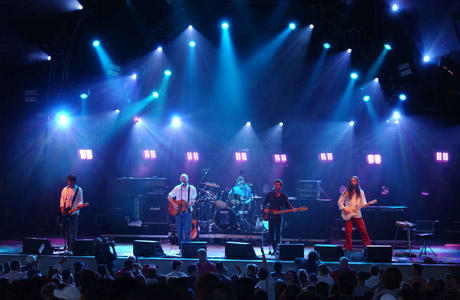Matt Lamarche is a sound mixer and tour manager who works with artists like David Usher, Amanda Marshall and the Tragically Hip. He's currently Supervisor of Production Services with Ottawa's Centrepointe Theatre, but on weekends still enjoys life on the highway with Tom Cochrane.
How did you get into tour management?
Purely by accident. I was working [on a tour as sound mixer] and there was no tour management; things were getting advanced by management, which was great but often they weren't at the shows to deal with issues as they came up. Since nobody else wanted to take responsibility, I did. I had experience on the road; the way things should get sorted out were all things I was familiar with. So I just took it over. Still doing it.
What are the most important elements of being a good tour manager?
The key thing is making contact with the venue and the production people well in advance, to go over logistics and scheduling and crew and equipment, so everyone's clear on who's doing what. Knowing where to park a bus ― it seems trivial until you get there.
Is it necessary for TMs to have additional skills like mixing?
A lot of bands can't afford to have a dedicated sound guy, so combining it with a tour manager helps ― they know they can hire me to help out. It saves a bit of money, although the day rate is higher if you're doing two jobs. A business background really helps, since a lot of what you do is accounting. Technical skills and knowing what's involved in putting on a show with sound and lighting and security, that's useful too.
What should musicians know about working with a TM? Do they expect you to fetch them lattes?
No! Well, it depends on the artist. Maybe you shouldn't print that. At some point the TM and the artist will have a conversation about what the TM is planning on doing. For the most part, the TM is there to help and protect the artist and make sure everything goes okay.
Is there stuff you have to prep for when crossing the U.S, border?
Making sure you have all the visas in place, and if you're bringing in vehicles and equipment you might need a bond or carnet to certify that it's yours and that you'll be bringing it back into Canada. If you are crossing at a specific place you can call that border office and fax over your visas and paperwork in advance so that they are aware of you and your gear. It's good to have copies of contracts for your shows in the U.S.
So do you have any juicy road stories?
Oh, I have lots! But I had to sign non-disclosure agreements.
How did you get into tour management?
Purely by accident. I was working [on a tour as sound mixer] and there was no tour management; things were getting advanced by management, which was great but often they weren't at the shows to deal with issues as they came up. Since nobody else wanted to take responsibility, I did. I had experience on the road; the way things should get sorted out were all things I was familiar with. So I just took it over. Still doing it.
What are the most important elements of being a good tour manager?
The key thing is making contact with the venue and the production people well in advance, to go over logistics and scheduling and crew and equipment, so everyone's clear on who's doing what. Knowing where to park a bus ― it seems trivial until you get there.
Is it necessary for TMs to have additional skills like mixing?
A lot of bands can't afford to have a dedicated sound guy, so combining it with a tour manager helps ― they know they can hire me to help out. It saves a bit of money, although the day rate is higher if you're doing two jobs. A business background really helps, since a lot of what you do is accounting. Technical skills and knowing what's involved in putting on a show with sound and lighting and security, that's useful too.
What should musicians know about working with a TM? Do they expect you to fetch them lattes?
No! Well, it depends on the artist. Maybe you shouldn't print that. At some point the TM and the artist will have a conversation about what the TM is planning on doing. For the most part, the TM is there to help and protect the artist and make sure everything goes okay.
Is there stuff you have to prep for when crossing the U.S, border?
Making sure you have all the visas in place, and if you're bringing in vehicles and equipment you might need a bond or carnet to certify that it's yours and that you'll be bringing it back into Canada. If you are crossing at a specific place you can call that border office and fax over your visas and paperwork in advance so that they are aware of you and your gear. It's good to have copies of contracts for your shows in the U.S.
So do you have any juicy road stories?
Oh, I have lots! But I had to sign non-disclosure agreements.
